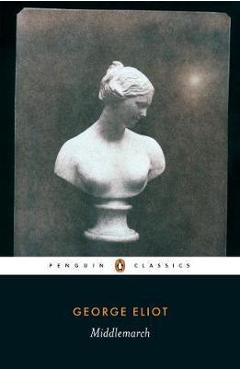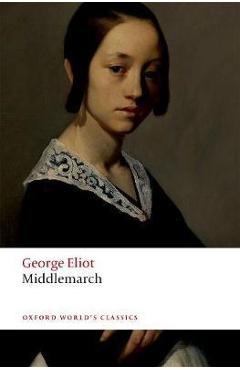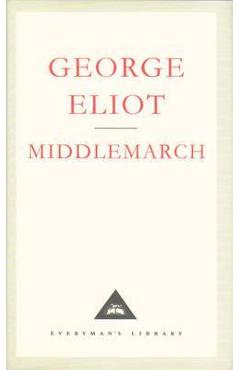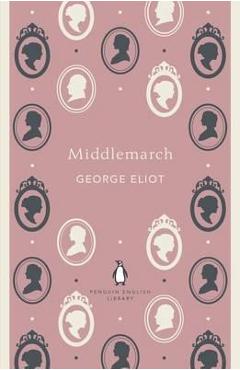Middlemarch - George Eliot

Detalii Middlemarch - George Eliot
Produs actualizat în urmă cu 2 luni
Descriere YEO:
Descriere magazin:
It was George Eliot\'s ambition to create a world and to portray a whole community--tradespeople, middle classes, country gentry--in the rising fictional provincial town of Middlemarch, circa 1830. George Eliot\'s Victorian masterpiece: a magnificent portrait of a provincial town and its inhabitants George Eliot\'s novel, Middlemarch: A Study of Provincial Life , explores a fictional nineteenth-century Midlands town in the midst of modern changes. The proposed Reform Bill promises political change; the building of railroads alters both the physical and cultural landscape; new scientific approaches to medicine incite public division; and scandal lurks behind respectability. The quiet drama of ordinary lives and flawed choices are played out in the complexly portrayed central characters of the novel--the idealistic Dorothea Brooke; the ambitious Dr. Lydgate; the spendthrift Fred Vincy; and the steadfast Mary Garth. The appearance of two outsiders further disrupts the town\'s equilibrium--Will Ladislaw, the spirited nephew of Dorothea\'s husband, the Rev. Edward Casaubon, and the sinister John Raffles, who threatens to expose the hidden past of one of the town\'s elite. Middlemarch displays George Eliot\'s clear-eyed yet humane understanding of characters caught up in the mysterious unfolding of self-knowledge. This Penguin Classics edition uses the second edition of 1874 and features an introduction and notes by Eliot-biographer Rosemary Ashton. In her introduction, Ashton discusses themes of social change in Middlemarch , and examines the novel as an imaginative embodiment of Eliot\'s humanist beliefs. For more than sixty-five years, Penguin has been the leading publisher of classic literature in the English-speaking world. With more than 1,500 titles, Penguin Classics represents a global bookshelf of the best works throughout history and across genres and disciplines. Readers trust the series to provide authoritative texts enhanced by introductions and notes by distinguished scholars and contemporary authors, as well as up-to-date translations by award-winning translators.

Middlemarch - George Eliot - Disponibil la libris.ro
Pe YEO găsești Middlemarch - George Eliot de la George Eliot, în categoria Fiction.
Indiferent de nevoile tale, Middlemarch - George Eliot din categoria Fiction îți poate aduce un echilibru perfect între calitate și preț, cu avantaje practice și moderne.
Preț: 66.96 Lei
Caracteristicile produsului Middlemarch - George Eliot
- Brand: George Eliot
- Categoria: Fiction
- Magazin: libris.ro
- Ultima actualizare: 28-10-2025 01:22:05
Comandă Middlemarch - George Eliot Online, Simplu și Rapid
Prin intermediul platformei YEO, poți comanda Middlemarch - George Eliot de la libris.ro rapid și în siguranță. Bucură-te de o experiență de cumpărături online optimizată și descoperă cele mai bune oferte actualizate constant.
Descriere magazin:
It was George Eliot\'s ambition to create a world and to portray a whole community--tradespeople, middle classes, country gentry--in the rising fictional provincial town of Middlemarch, circa 1830. George Eliot\'s Victorian masterpiece: a magnificent portrait of a provincial town and its inhabitants George Eliot\'s novel, Middlemarch: A Study of Provincial Life , explores a fictional nineteenth-century Midlands town in the midst of modern changes. The proposed Reform Bill promises political change; the building of railroads alters both the physical and cultural landscape; new scientific approaches to medicine incite public division; and scandal lurks behind respectability. The quiet drama of ordinary lives and flawed choices are played out in the complexly portrayed central characters of the novel--the idealistic Dorothea Brooke; the ambitious Dr. Lydgate; the spendthrift Fred Vincy; and the steadfast Mary Garth. The appearance of two outsiders further disrupts the town\'s equilibrium--Will Ladislaw, the spirited nephew of Dorothea\'s husband, the Rev. Edward Casaubon, and the sinister John Raffles, who threatens to expose the hidden past of one of the town\'s elite. Middlemarch displays George Eliot\'s clear-eyed yet humane understanding of characters caught up in the mysterious unfolding of self-knowledge. This Penguin Classics edition uses the second edition of 1874 and features an introduction and notes by Eliot-biographer Rosemary Ashton. In her introduction, Ashton discusses themes of social change in Middlemarch , and examines the novel as an imaginative embodiment of Eliot\'s humanist beliefs. For more than sixty-five years, Penguin has been the leading publisher of classic literature in the English-speaking world. With more than 1,500 titles, Penguin Classics represents a global bookshelf of the best works throughout history and across genres and disciplines. Readers trust the series to provide authoritative texts enhanced by introductions and notes by distinguished scholars and contemporary authors, as well as up-to-date translations by award-winning translators.






